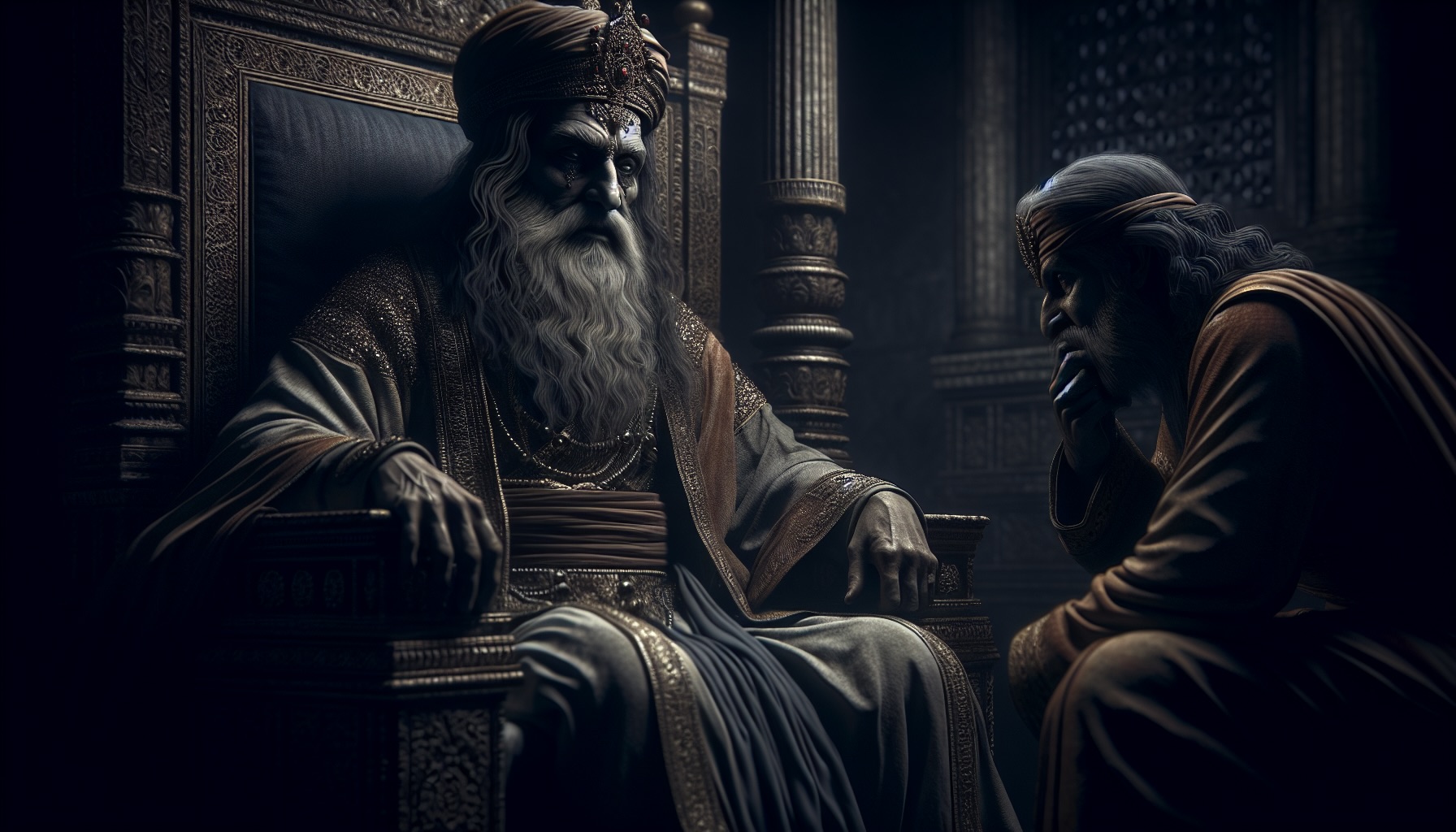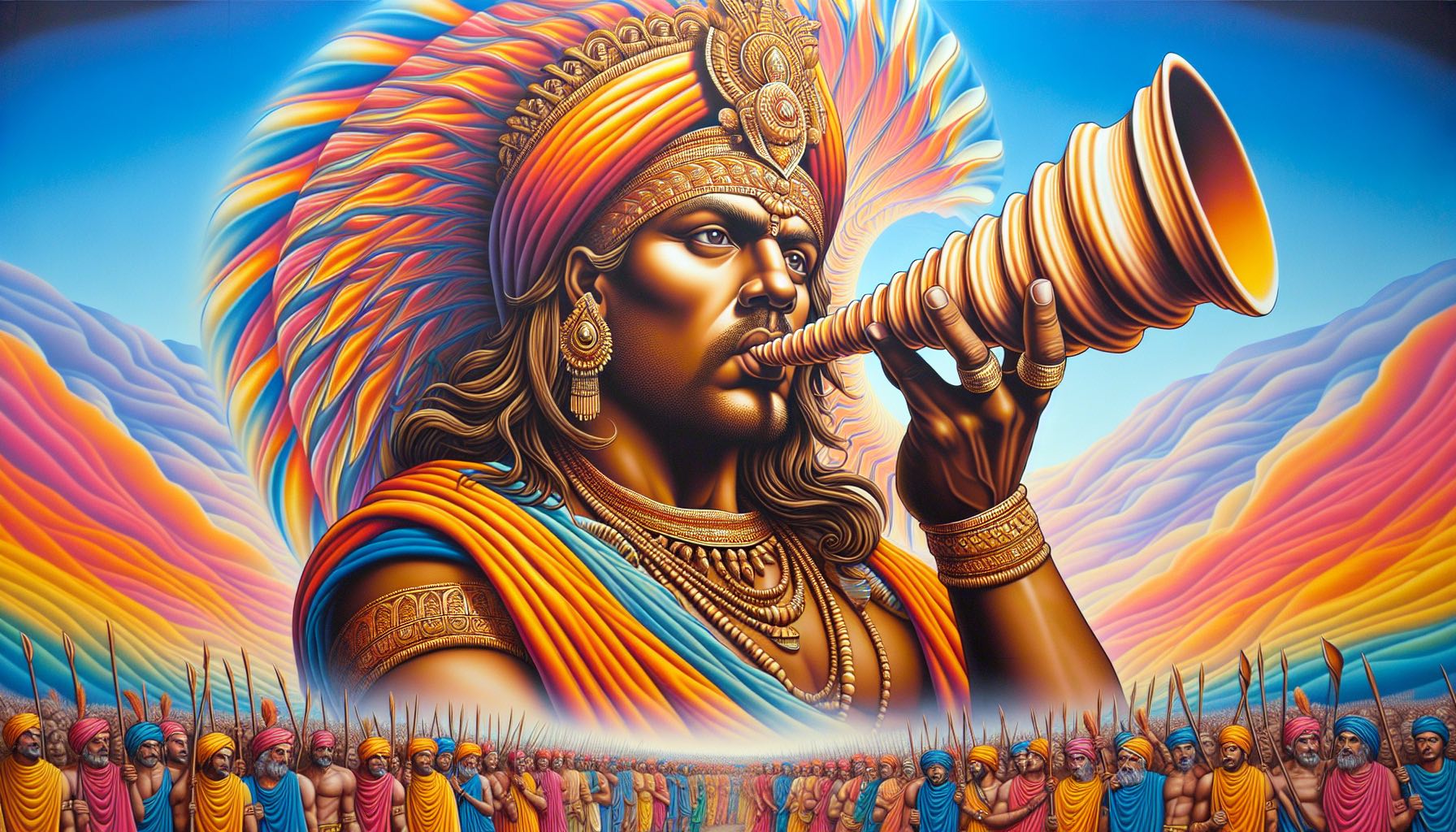BG 1.1 - 47
Dhritarashtra said:
In this realm of Dharma, on the sacred field of Kurukshetra, my sons have gathered to fight with the sons of Pandu. Tell me Sanjaya, what is happening now?
[1]

Sanjaya replied:
Upon seeing the army of the Pandavas arrayed for battle, Duryodhana approached his teacher Drona and said these words.
[2]
Behold! The mighty Pandava army, marshalled for battle by your own gifted disciple, Dhrishtadyumna. They have many powerful warriors like Yuyudhan, Virat, and Drupad, equal to Bhima and Arjun in military prowess. They have with them the best of men - Dhristaketu, Chekitan, Purujit, Kuntibhoja, Śaibya, and the King of Kashi. They have with them the courageous Yudhamanyu, the gallant Uttamauja, the sons of Subhadra, and the sons of Draupadi - all great warriors.
Know also of the qualified generals on our side, who I will now recount to you. We have leaders like you, Bhishma, Karna, Kripa, Ashvatthama, Vikarna, and Bhurishrava, who have many victories in battle. There are also many heroic warriors prepared to die for my cause. They are equipped with various weapons and are skilled in the art of warfare. Though our strength may be limited, it is protected by Grandsire Bhishma. Their strength, protected by Bhima, appears unlimited. Therefore all of you, stationed firmly in your respective positions, should protect Bhishma above all.
To Duryodhana's delight, the grandsire of the Kuru dynasty let out a lion's roar and loudly blew his conch. Suddenly, all the conches, drums, trumpets, and horns blared forth a tumultuous uproar. Then, from a glorious chariot yoked with white horses, Krishna and Arjuna blew their divine conch shells. Krishna blew a conch named Panchajanya, Arjuna blew a conch named Devadatta, and Bhima blew the great conch named Paundra. Yudhisthira blew his conch Anantavijay, while Nakula and Sahadeva blew the Sughosha and Manipushpaka conches. The King of Kashi, wielding a great bow, the mighty warrior Shikandi, Dhrishtadyumna, Virat, and the invincible Satyaki, Drupad, the sons of Draupadi, and the mighty Abhimanyu, all blew their respective conch shells.

That tumultuous uproar reverberated through heaven and earth, and shattered the hearts of your sons.
[19]Seeing Dhritirashtra's sons arrayed for war, Arjuna picked up his bow and spoke the following words to Krishna.
[20]
Arjuna said:
Place my chariot between the two armies
[21]so I may have a good look at those with whom I must fight in this great war.
[22]I wish to gaze upon those who have gathered here to please the misguided son of Dhritarashtra.
[23]
Hearing Arjuna's request, Krishna drew up his magnificent chariot between the two armies. In the presence of Bhishma, Drona, and all the other kings, Krishna said "behold, the Kuru dynasty has gathered". As Arjuna gazed over both armies, he saw his fathers, grandfathers, teachers, uncles, brothers, sons, grandsons, fathers-in-law, and friends. Upon realizing how many of his relatives and friends were assembled there, he spoke his next words to Krishna with deep sorrow and compassion.
Arjuna said:
Seeing all my kinsmen present here, eager to fight,
[28]my limbs are weak, my mouth is drying up, my body is trembling, and my hairs are standing on end.
[29]My bow is slipping from my hand, and my skin is burning. I can no longer stand - my mind is spinning.
[30]I foresee bad omens and misfortune from killing my kinsmen in battle.
[31]I desire no victory, empire, nor earthly pleasures. What do we gain from having this kingdom, or even life itself?
[32]
Those for whose sake we desire this kingdom, stand here in battle, ready to give up their lives and wealth. These are our teachers, fathers, grandfathers, sons, uncles, in-laws, and kinsmen. I would not slay them for dominion over the three worlds, let alone for the sake of one kingdom on Earth. What pleasure will there be in killing the sons of Dhritarashtra? We would only incur sin by killing these aggressors. How can we be happy after killing our own family and friends? Even though their minds are so overpowered by greed that they see no problem in killing their relatives and friends, why should we, who clearly see the evil in killing our own clan, not turn away from committing this crime?
When a community perishes, its traditions and duties are destroyed, and the families are overcome by immorality. When impiety prevails, the women become immoral, and children of mixed social groups are born. Promiscuity ruins both the family and those who defile it, depriving the ancestors of ritual offerings. By the destruction of lineages and the intermingling of social classes, ancient traditions and family values are destroyed. The wise say that those who destroy family traditions are destined for hell. What a pity that we have decided to commit this great sin, prepared to slay our kinsmen for the pleasures of kingdom. It would be better if the sons of Dhritarashtra should slay me in battle, unarmed and unresisting.
Having said these words, Arjuna cast aside his bow and arrow, and sat down in his chariot overcome with grief.
Next chapter

2. Transcendental Knowledge
Sānkhya Yog

